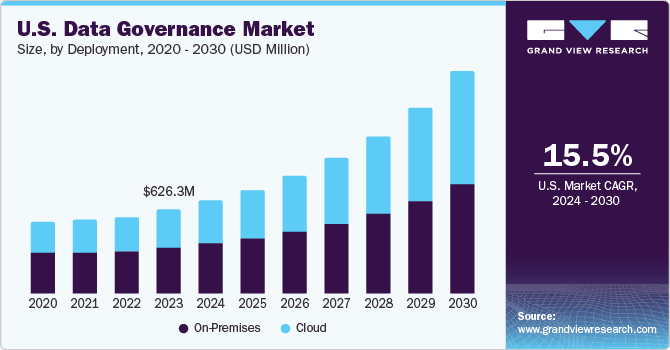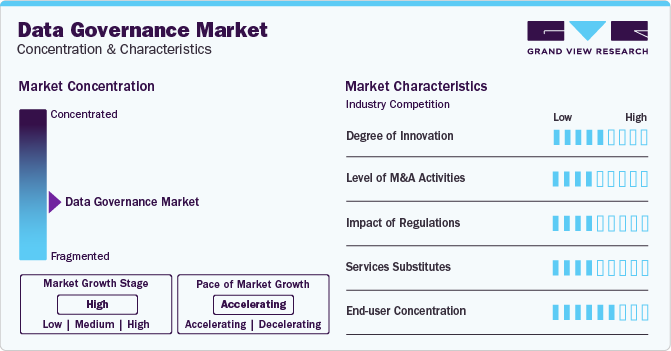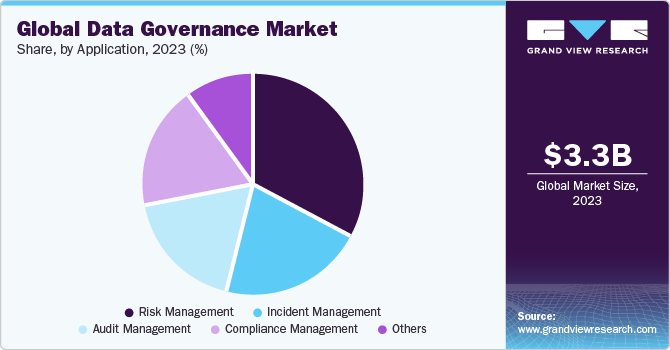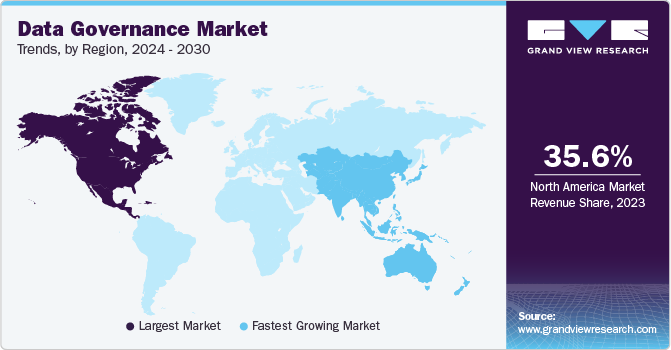
Data Governance Market Size, Share & Trends Analysis Report By Component (Solution, Services), By Application (Risk Management, Compliance Management), By Deployment (On-premises, Cloud), By Vertical, By Region, And Segment Forecasts, 2024 - 2030
- Report ID: GVR-4-68040-237-5
- Number of Report Pages: 140
- Format: PDF
- Historical Range: 2018 - 2022
- Forecast Period: 2024 - 2030
- Industry: Technology
Data Governance Market Size & Trends
The global data governance market size was estimated at USD 3.35 billion in 2023 and is projected to grow at a CAGR of 21.7% from 2024 to 2030. The increasing volume and complexity of data generated by organizations across various sectors, with the proliferation of digital technologies, is expected to drive market growth. Businesses collect vast amounts of data from diverse sources, including customer interactions, transactions, social media, and IoT devices. This exponential growth in data creates challenges related to data quality, privacy, security, and compliance, necessitating data governance solutions to effectively manage and govern this information.

Data governance involves overseeing the accessibility, usability, integrity, and security of data within enterprise systems, guided by internal data standards and policies that determine data utilization. Successful data governance ensures data reliability and coherence while preventing improper use. Its importance grows as businesses encounter evolving data privacy mandates and increasingly rely on data analytics to streamline operations and inform strategic decisions. A comprehensive data governance initiative usually comprises a governance team, a steering committee as the overseeing authority, and an affiliate of data stewards. Collaboratively, they establish the guidelines and protocols for data governance alongside designing and implementing strategies, primarily overseen by the data stewards. Ideally, this effort involves executives and other stakeholders from the business operations alongside IT and data management teams.
With the increasing adoption of digital technologies and the interconnectedness of systems, organizations face aggravated risks related to data security. High-profile cyberattacks and data breaches have underscored the vulnerabilities inherent in insufficient data governance practices, prompting businesses to prioritize robust data management and governance frameworks. Cybersecurity threats pose significant financial, operational, and reputational risks to organizations of all sizes and across various industries. Malicious players continuously exploit vulnerabilities in systems and networks to gain unauthorized access to sensitive data, leading to data breaches, financial losses, and damage to brand reputation. In response, businesses recognize the importance of implementing comprehensive data governance solutions to mitigate cybersecurity risks effectively, thus driving the growth of the data governance market.
Moreover, regulatory requirements and compliance mandates also drive the adoption of data governance solutions in response to cybersecurity concerns. Governments worldwide have enacted stringent data protection regulations, such as GDPR, CCPA, and others, to protect individuals' privacy rights and regulate the handling of personal data. Failure to comply with these regulations can result in fines, severe penalties, and legal consequences. Therefore, organizations are compelled to implement data governance frameworks to ensure compliance with regulatory requirements and avoid possible sanctions.
Market Concentration & Characteristics
The market growth stage is high, and the pace is accelerating. The rapid technological advancements drive innovation and continuous improvement in data governance solutions. Emerging technologies such as artificial intelligence, machine learning, blockchain, and cloud computing are increasingly integrated into data governance platforms, enabling enhanced automation, analytics-driven insights, and real-time monitoring capabilities.

The market has a fragmented nature, featuring several global and regional players. The market players are investing in research & development (R&D) to develop advanced solutions and gain a competitive edge. Moreover, they are entering into partnerships and mergers & acquisitions as the market is characterized by innovation, disruption, and rapid change.
Component Insights
The solution segment led the market with the largest revenue share of 55.1% in 2023 and is expected to continue to dominate the vertical over the forecast period. The exponential growth in data volume and complexity is expected to drive the growth of the data governance market. According to statistics by exploringtopics, around 328.77 million terabytes of data are created daily, and 181 zettabytes of data will likely be generated by 2025.
The services segment is anticipated to witness the fastest CAGR during the forecast period. Many organizations operate in complex IT environments with many software applications and platforms. Data governance services help organizations navigate vendor consolidation and integration challenges by assessing their existing technology landscape, identifying redundant or overlapping solutions, and implementing integrated data governance platforms that streamline data management processes and improve operational efficiency.
Application Insights
The risk management segment held the largest revenue share in 2023. The growing emphasis on business continuity and resilience further drives the adoption of risk management applications in data governance. Organizations recognize the importance of maintaining continuous access to critical data and ensuring the availability and integrity of data assets in the event of disruptions, disasters, or cyberattacks. According to insights by Hiscox, 41% of organizations that experienced an attack in the previous year reported decreased risk exposure.

The compliance management segment is expected to witness the fastest CAGR during the forecast period. The growing complexity of regulatory landscapes and the constant changes in compliance requirements pose significant challenges for organizations seeking to navigate and adhere to regulatory mandates effectively. Compliance management applications in data governance help organizations stay alongside evolving regulatory requirements by providing features such as compliance monitoring, regulatory intelligence, and automated compliance assessments. These applications enable organizations to assess their compliance posture, identify gaps and vulnerabilities, and implement controls and measures to address compliance deficiencies and mitigate associated risks.
Deployment Insights
The on-premise segment led the market with the largest revenue share in 2023 and is projected to grow at a significant CAGR over the forecast period. On-premise data governance solutions give organizations greater control over their data, allowing them to implement custom security measures, access controls, and encryption techniques to protect sensitive information from unauthorized access or breaches.
The cloud segment is expected to witness the fastest CAGR during the forecast period. The accessibility and ease of deployment offered by cloud-based data governance solutions contribute to their growing popularity. Cloud deployment eliminates the need for organizations to manage complex IT infrastructure or deploy software on-premise, as cloud service providers host and maintain data governance solutions, thus driving the growth of the cloud deployment in the data governance market over the forecast period.
Vertical Insights
The BFSI segment dominated the market in 2023 and is projected to grow at a significant CAGR over the forecast period. The BFSI sector's increasing data quantity and complexity drive demand for effective data governance solutions. Financial institutions collect vast amounts of data from multiple sources, including customer transactions, account information, market data, and regulatory reports. Managing and governing this data effectively is essential for ensuring data quality, accuracy, and consistency and facilitating data-driven decision-making, risk management, and regulatory reporting within the sector, thus driving the market’s growth.
The healthcare segment is expected to grow significantly during the forecast period, owing to the growing emphasis on patient privacy and data security regulations, such as the Health Insurance Portability and Accountability Act (HIPAA) in the U.S. and the General Data Protection Regulation (GDPR) in Europe, is driving healthcare organizations to implement efficient data governance frameworks. These regulations mandate strict controls over the collection, storage, processing, and sharing of patient health information (PHI) and impose severe penalties for non-compliance, fueling the growth of data governance solutions in healthcare.
Regional Insights
The North America data governance market held a revenue share of 35.6% in 2023 and is projected to grow at a CAGR of 16.9% over the forecast period, owing to the evolving regulatory landscape surrounding data privacy and protection. For instance, the California Consumer Privacy Act (CCPA) raises awareness about the importance of data privacy. It imposes stringent requirements on organizations regarding the collection, storage, processing, and sharing of personal and sensitive data, thus driving the growth of the data governance framework in the region.

U.S. Data Governance Market Trends
The U.S. dominated the market with a revenue share of 52.6% in 2023. The market growth in the country is attributed to the increasing volume and complexity of data generated by organizations across various sectors that have fueled the need for robust data governance frameworks. Additionally, the U.S. accounted for over 18% of revenue share in the global data governance market in 2023.
Europe Data Governance Market Trends
The Europe market for data governance was identified as a lucrative region in this vertical due to the increasing digital transformation of industries and the rise of digital platforms and ecosystems in the region. Organizations are increasingly leveraging digital technologies to innovate, transform business processes, and deliver new products and services to customers, thus driving the growth of the data governance market in the region.
The UK data governance market is expected to grow at a significant CAGR over the forecast period due to the increasing emphasis on data-driven decision-making and analytics initiatives driving the adoption of data governance in Italy. Italian businesses leverage data analytics, AI, and machine learning technologies to extract insights, identify trends, and optimize business processes. Effective data governance practices are essential to ensuring the accuracy, reliability, and trustworthiness of the data used in these analytics initiatives and facilitating data integration, standardization, and sharing across organizational departments.
The data governance market in Germany is expected to grow significantly over the forecast period. German organizations recognize the importance of integrating data governance practices into broader GRC initiatives to manage risks effectively, ensure regulatory compliance, and enhance business resilience.
Asia Pacific Data Governance Market Trends
The Asia Pacific is anticipated to grow at the fastest CAGR of 28.0% during the forecast period. As countries in the Asia Pacific embrace urbanization and digital transformation, governments and municipalities are investing heavily in smart city projects to enhance infrastructure, improve public services, and promote sustainable development. These initiatives rely heavily on data collection, analysis, and utilization from various sources such as IoT sensors, mobile devices, and public services. As a result, there is an increasing need for robust data governance frameworks to manage and govern the vast amounts of data generated by smart city infrastructure, thus fueling market growth.
The data governance market in China is expected to grow at a significant CAGR over the forecast period, owing to the increasing focus on data security and privacy. With the growing frequency and sophistication of cyberattacks, Chinese organizations prioritize data security measures to protect sensitive information from unauthorized access, data breaches, and other security incidents.
The South Korea data governance market is expected to grow at a significant CAGR over the forecast period due to the rise of data-sharing initiatives that drive the need for data governance. With the emergence of data ecosystems comprising multiple stakeholders, including government agencies, private sector organizations, research institutions, and non-profit organizations, there is a growing need to establish governance structures and mechanisms to facilitate data sharing, collaboration, and interoperability.
Middle East & Africa Data Governance Market Trends
Adopting advanced technologies such as cloud computing, artificial intelligence, and big data analytics in the Middle East and Africa drives the region's demand for effective data governance. These technologies enable organizations to capture, analyze, and derive insights from vast real-time data, revolutionizing business operations and customer experiences. However, with proper governance mechanisms in place, organizations can avoid data breaches, compliance violations, and reputational damage, thus driving the growth of the data governance market in the region.
The Saudi Arabia data governance market is expected to grow significantly over the forecast period due to the increasing adoption of digital healthcare solutions. As Saudi Arabia advances its healthcare sector through digital transformation initiatives, including implementing electronic health records (EHRs), telemedicine platforms, and health information exchange systems, there is a significant rise in the volume and complexity of healthcare data generated and exchanged.
Key Data Governance Company Insights
Some of the key players operating in the market include Oracle; SAS; SAP; IBM
-
Oracle Corporation is a multinational computer technology company that provides products and services to address enterprise information technology environments worldwide. The company offers cloud-based solutions, including Software-as-a-Service (SaaS), Infrastructure-as-a-Service (IaaS), database and middleware, applications, cloud infrastructure, and hardware systems. Oracle's core application software is a suite of enterprise software products, such as enterprise resource planning, human capital management, customer relationship management, enterprise performance management, data governance solutions, and supply chain management software.
-
SAP SE is a multinational software corporation providing enterprise software and services to businesses of various sizes and industries. The company offers solutions, such as enterprise resource planning and financial management, intelligent technologies, analytics, human resources, product information management, digital supply chain, customer relationship management, and customer experience. SAP offers a Master Data Governance solution that enables organizations to manage high-quality, unified master data across various domains and sources. SAP operates in Europe, the Middle East, Africa, the Americas, and Asia-Pacific, serving clients in consumer products, oil, gas, energy, financial services, aerospace and defense, transportation, and logistics.
Talend and Infogix are some of the other market participants in the data governance market.
-
Infogix, Inc. is a multinational data control and analytics software company offering data governance, quality, and analytics capabilities. The company primarily serves clients in the financial services, telecommunications, healthcare, property and casualty insurance, and retail industries.
-
Talend is an open-source data integration platform that provides various software and services for data integration, management, data quality, enterprise application integration, cloud storage, and Big Data. The platform helps organizations enhance data accessibility, improve quality, and swiftly move data to target systems. Its solutions are utilized across various industries, such as retail, e-commerce, healthcare, financial services, and telecommunications.
Key Data Governance Companies:
The following are the leading companies in the data governance market. These companies collectively hold the largest market share and dictate industry trends.
- Oracle
- SAP
- IBM
- SAS
- Informtica
- Talend
- Magnitude Software
- Infogix
- Zaloni
- Alex Solutions
Recent Developments
-
In June 2023, Privacera, a cloud data governance and security company, launched a preview of Privacera AI Governance. The new solutions empower companies to manage the entire AI data security lifecycle.
-
In September 2023, Fasoo, a data-centric security company, partnered with Egnyte to allow companies to encrypt any file managed by Egnyte and embed Egnyte permissions directly into the protected file, ensuring governance is maintained regardless of the file's location.
Data Governance Market Report Scope
|
Report Attribute |
Details |
|
Market size value in 2024 |
USD 3.91 billion |
|
Revenue forecast in 2030 |
USD 12.66 billion |
|
Growth rate |
CAGR of 21.7% from 2024 to 2030 |
|
Base year for estimation |
2023 |
|
Historical data |
2018 - 2022 |
|
Forecast period |
2024 - 2030 |
|
Quantitative units |
Revenue in USD million/billion and CAGR from 2024 to 2030 |
|
Report coverage |
Revenue forecast, company ranking, competitive landscape, growth factors, and trends |
|
Segments covered |
Component, application, deployment, vertical, region |
|
Regional scope |
North America; Europe; Asia Pacific; Latin America; MEA |
|
Country scope |
U.S.; Canada; UK; Germany; France; China; India; Japan; South Korea; Australia; Brazil; Mexico; UAE; Saudi Arabia; South Africa |
|
Key companies profiled |
Oracle; SAP; IBM; SAS; Informtica; Talend; Magnitude Software; Infogix; Zaloni; Alex Solutions; Mindtree |
|
Customization scope |
Free report customization (equivalent up to 8 analyst’s working days) with purchase. Addition or alteration to country, regional, and segment scope |
|
Pricing and purchase options |
Avail customized purchase options to meet your exact research needs. Explore purchase options |
Global Data Governance Market Report Segmentation
This report forecasts revenue growth at global, regional, and country levels and provides an analysis of the latest vertical trends in each of the sub-segments from 2018 to 2030. For this report, Grand View Research has segmented the global data governance market report based on component, application, deployment, vertical, and region:
-
Component Outlook (Revenue, USD Million, 2018 - 2030)
-
Services
-
Solution
-
-
Application Outlook (Revenue, USD Million, 2018 - 2030)
-
Compliance Management
-
Risk Management
-
Audit Management
-
Incident Management
-
Others
-
-
Deployment Outlook (Revenue, USD Million, 2018 - 2030)
-
On-Premises
-
Cloud
-
-
Vertical Outlook (Revenue, USD Million, 2018 - 2030)
-
BFSI
-
Retail & Consumer
-
Government
-
Healthcare
-
Manufacturing
-
Telecom and IT
-
Transportation & Logistics
-
Other
-
-
Regional Outlook (Revenue, USD Million, 2018 - 2030)
-
North America
-
U.S.
-
Canada
-
-
Europe
-
UK
-
Germany
-
France
-
-
Asia Pacific
-
China
-
India
-
Japan
-
South Korea
-
Australia
-
-
Latin America
-
Brazil
-
Mexico
-
-
Middle East & Africa
-
UAE
-
Saudi Arabia
-
South Africa
-
-
Frequently Asked Questions About This Report
b. The global data governance market size was estimated at USD 3.35 billion in 2023 and is expected to reach USD 3.91 billion in 2024
b. The global data governance market is expected to grow at a compound annual growth rate of 21.7% from 2024 to 2030 to reach USD 12.66 billion by 2030.
b. The solution segment led the market with the largest revenue share of 55.1% in 2023 and is expected to continue to dominate the vertical over the forecast period. The exponential growth in data volume and complexity is expected to drive the growth of the data governance market.
b. Some key players operating in the data governance market include Oracle; SAP; IBM; SAS; Informtica; Talend; Magnitude Software; Infogix; Zaloni; Alex Solutions; Mindtree
b. The increasing volume and complexity of data generated by organizations across various sectors, with the proliferation of digital technologies, are driving the growth of the data governance market.
We are committed towards customer satisfaction, and quality service.
"The quality of research they have done for us has been excellent."




